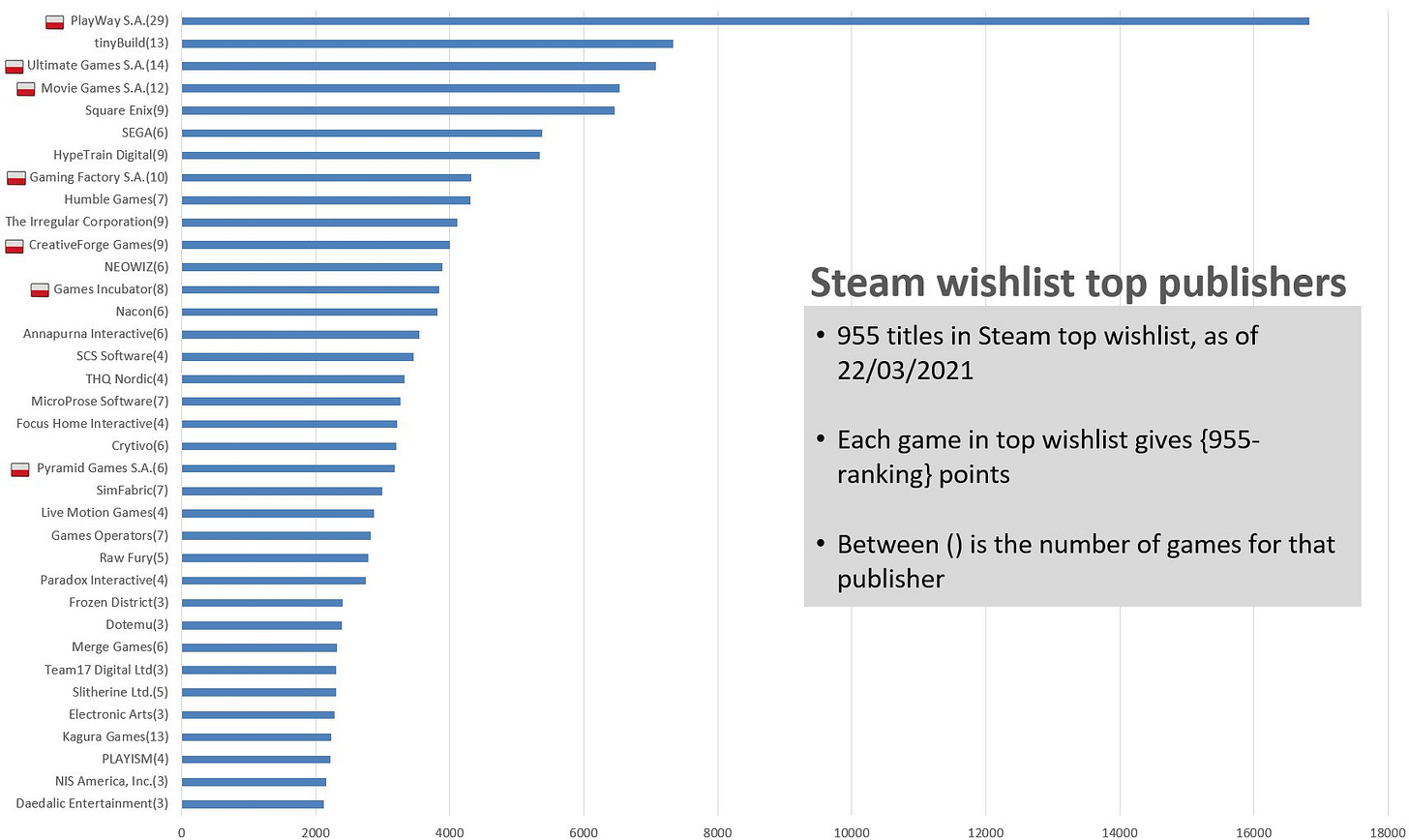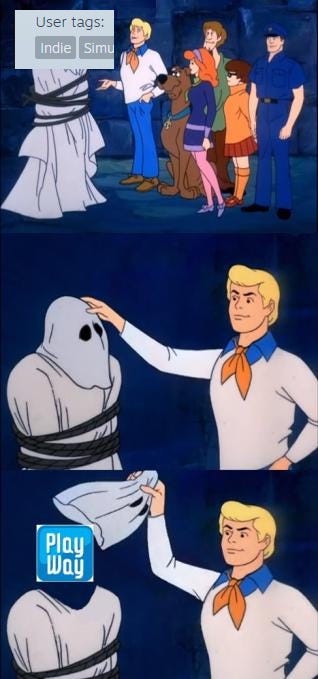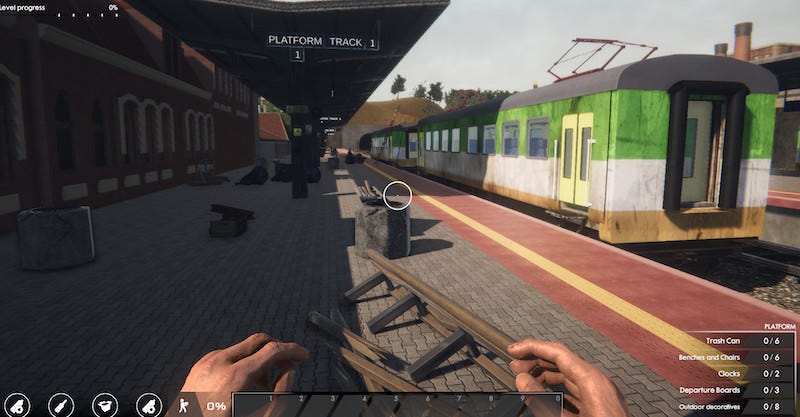What PlayWay should - and shouldn't - teach us about game publishing
Lessons from one of the more controversial PC game publishers.
[The GameDiscoverCo game discovery newsletter is written by ‘how people find your game’ expert & GameDiscoverCo founder Simon Carless, and is a regular look at how people discover and buy video games in the 2020s.]
Welcome back to the GameDiscoverCo newsletter! The lead story in this particular newsletter has been in gestation for some time. But I kept putting off writing it, because the subject is… well, thorny and complex.
However, there’s no time like the present to chunk through this, so… let’s do it!
(If you like this piece, consider those signing up to GameDiscoverCo Plus, our premium tier which includes a weekly newsletter analyzing Switch & Steam game trends, access to back-end ‘Hype’ data for every single unreleased Steam game, a member-only Discord & more.)
What do you really know about PlayWay?
French game financier Stephane Rappeneau posted the below very useful graph on Twitter recently, analyzing the top Steam publishers - by using wishlist rankings for unreleased Steam games.
Sure, you can quibble over the linear scoring methodology. But the broad strokes are right. A number of canny, borderline Machiavellian Poland-based publishers are flooding the top unreleased Steam games, if you rank by sheer number of titles - and Polish behemoth PlayWay and its many linked studios are the vast majority.
Not only does PlayWay lead the whole publisher pack, with a whopping 29 unreleased games, a number of them in the Top 100. But a bunch of the other Polish Top 10 publishers listed here are majority or large minority owned by PlayWay (Ultimate Games, Movie Games, CreativeForge Games, Gaming Factory, Pyramid Games) and funnel through the same merciless ideas, promotion and cross-marketing machine.
(The Polish-only subsidiaries/linked studios thing helps with public stock valuation - both for PlayWay or some of the closely linked firms, which also command lofty share prices. Poland has an extraordinary number of public game companies - so much so that the Warsaw Stock Exchange is boasting it has more game company listings than Tokyo or Seoul. All a somewhat different version of the Embracer ‘katamari’.)
It’s not like a bunch of players haven’t spotted this. There are recent YouTube videos out there like ‘The Problem with PlayWay Games’. And if you haven’t seen the below meme about PlayWay’s multitude of linked studio aliases - well, now you have:
But there’s also a lot to learn from how PlayWay and its friends are succeeding with good quality games - even as they carry out business practices that some might find distasteful or problematic. Heck, the conglomerate as a whole has had smash-hit games like House Flipper, Car Mechanic Simulator, and Drug Dealer Simulator and well-received recent titles like The Tenants and Mr. Prepper.
So what’s their story and what’s different about them, as we understand it? Let’s analyze:
PlayWay largely tells its developers what games it wants them to make.
Almost unprecedentedly in current ‘premium’ game publishers, there is a centralized ideas machine at PlayWay and associated companies. It generates, vets and commissions a large amount of ideas for games, and then works with newer Polish game devs to put them into action.
How can we tell this? Well, almost all of the titles made by PlayWay and associated studios follow a ‘style’ pattern - generally realistic 3D simulator or city builder titles, with recent forays beyond that. A PlayWay-’style’ game is often quite obvious, particularly because we believe there’s a centralized team making a lot of the initial Steam game trailers.
And this level of control is possible because these titles are made by studios that PlayWay has an ownership stake in. (This is generally a pre-requisite of working with the conglomerate.) Many might see this as predatory - most ‘regular’ publishing deals don’t come with ownership strings like this, after all! And it’s not always clear what protections devs have as minority shareholders. But some of the public company valuations may also be a driver to sign up?
So how central ideas-driven is the company? Well, recently PlayWay has gone so far as to launch a crypto-based ‘game idea’ platform to the public. “Each user can submit one idea for which they will receive 1 PWAY token. If the company likes this project, the entire concept will be published in the internal PlayWay system, available to the group’s development companies.” So now, even players can generate ideas for PlayWay’s vat of ideas. Crazy, huh?
But it is worth noting that PlayWay’s ideas are generally well thought-out and commercial in nature. For example, although you can argue it’s a bit derivative, Mr. Prepper correctly identified a lack of Fallout Shelter-style games and (eventually) shipped a competitive game in the genre - a smart move on their part.
The company float LOTS of game ideas out there - but prioritize the ones that get traction.
Sometimes, people try to paint PlayWay & associated studios as ‘the company that always announces games that it never intends to make’. And that’s not 100% true. But what becomes clear is that PlayWay’s MO is to load up on announcements - and prioritize the titles that people care about.
A great example is SimulaM, a PlayWay-associated studio which announced it was working on I Am Jesus Christ (yes, a saviour simulator!) back in 2019. The game’s fairly surreal Steam page includes the bullet point that ‘over 30 miracles’ can be performed by the player as Jesus.
Side note: was intrigued to see comments on why the game was being made, with the dev claiming: “First idea about this [for it to be a CG movie] came to me when I was 16 years old... After we met with Playway company and shared our idea, they fully supported us and said that we need to make such game.”
Multiple people then try to ask - are the developers Christian? And the thread is closed. Look… I Am Jesus Christ lives in a PlayWay catalog alongside games like Drug Dealer Simulator and Bum Simulator, which are 100% amoral. It’s an amoral take on Jesus (!) And not only that, it’s now talking about launching a Kickstarter later in 2021. For a game announced in 2019, by a publisher who has plenty of money to fund dev.
And then you look at the other games also announced on Steam by SimulaM, all except one listed as coming out in 2021. There’s Moon Farming (a farming game set on the moon), there’s Noah’s Ark (a realistic ark-building simulator), and there’s Jungle House (a jungle based house-building simulator, somewhat inspired by some popular YouTube videos).
Is SimulaM working on each of these games with a full team right now? Don’t think so. Are any of these games coming out in 2021? Almost certainly not. To a large extent, this looks like a popularity/Steam wishlist waiting game engineering by PlayWay: work out which titles end up getting the most sustained interest, and then build those.
But there is plenty of plausible deniability for that claim, as always with PlayWay. For example, Jungle House has a regular ‘devlog’ update every few months showing elements of the game. Here’s the latest video, mentioning the game engine had changed to Unreal, and showing some jungle environments and art assets.
But there’s no deep gameplay, and there’s nothing up to the quality of ‘target gameplay’ CG video on the Steam game page. A lot of these devlog updates just seem to be ‘playing for time’. So my presumption is that the title isn’t yet gaining enough interest to be pushed to the top of PlayWay’s development funnel. It’s… a pretty weird setup, right?
PlayWay pushes the boundaries of marketing & identity on Steam
The most recent fuss over PlayWay came because of an attempted ‘fast follow’ from the company. After the viking city builder game Manor Lords - legitimately made by a small/solo Polish developer - appeared on Steam last year, it was clear very quickly that it’d be a hit title. (It’s #17 in unreleased Steam wishlists right now!)
And then, just a little while later, Viking City Builder popped up, from alleged solo Polish developer ‘Roslagen’. And guess what? People are very interested in this game - it’s now #60 on unreleased game wishlists on Steam, with hundreds of thousands of wishlists. So there’s now quite a lot at stake.
It’s absolutely a ‘CG trailer’-led copy/’fast follow’ of Manor Lords, and judging by cross-promotion and official website mentions (some since scrubbed), it’s made by PlayWay. Popular YouTuber Resonant has made a video on the issue:
You can see quite a few examples of PlayWay marketing Viking City Builder on its official media - here’s an alleged RTX vs. non-RTX video for the game on its Facebook, btw.
Even more interestingly, the alleged solo developer of Viking City Builder is appearing in the game’s forums to defend himself. For example: “I'm making this game by myself and I'm not an expert in making trailers or marketing. The ads are mutual help from game developers. In terms of the name - I wanted it to be quickly associated with what we'll be doing in the game.”
Heck, there’s also a FAQ where this solo dev posts a picture of his desk with his name on it to, uhh, disprove the haters saying he’s not a solo dev?! These are almost alternate reality game levels of weirdness, at this point.
The bottom line: does it really matter if this game is made by one person or PlayWay’s machine, or one person put up to it by PlayWay - as long as it ships in the end and it’s good? That seems to be the angle PlayWay is counting on here. But some of this chicanery reminds me of ‘truthiness’ - “the quality of seeming or being felt to be true, even if not necessarily true.”
PlayWay seems to be a fan of truthiness in general. At times, it can feel like a Russian disinformation campaign as popularized by figures like Vladislav Surkov. Surkov, who helped mastermind disinformation for Putin, is described as “master of the complex and sly; postmodern deconstructor of binaries like ‘war’ or ‘peace’”. Surkov had an absurdist theater background, of course, but…
And the fact is - as the PlayWay CEO Krzysztof Kostowski is keen to remind people on social media (generally in Polish language), the company ends up shipping reasonably high quality products that sell. For example, The Tenants is a perfectly good game, and its latest news update shows high quality post-launch player support and gratified players. That can’t be faked.
Conclusion: what can we learn from PlayWay?
So, I definitely don’t want to be seen as an apologist for some of PlayWay’s behavior. Real people - players and devs alike - are affected here. The general concept of making ‘target gameplay’ trailers across more games than you intend to swiftly release, and prioritizing from there isn’t really a fair use of a platform.
To some extent, PlayWay is playing with fire here - although they mask it by using so many subsidiaries and aliases. You do need to get your Steam page concept-approved by Valve, and one of the points in there is: “Your screenshots must only contain gameplay. This means avoid using concept art [or] pre-rendered cinematic stills.”
And as the Manor Lords creator said in the YouTube comments to one of the videos on the Viking City Builder controversy: “This whole situation did sting a little. I think it would really benefit the industry to popularize the term 'concept trailer' - the developers and publishers could still do market research but without being dishonest.”
Yet the funny thing is that a lot of PlayWay’s market-led approach to games makes - well, a lot of sense. They’re identifying a lot of very interesting - if sometimes amoral or plain weird - subjects for games, and then executing on them well. And they’re great at promotion and cross-promotion.
The concept of a publisher identifying a niche, going to a developer and asking them to make a game for that niche is - in our view - undervalued in today’s market. So many people are just pitching games without looking at the market. Publishers and devs could work together in smarter ways to compete more intelligently.
But the actual process PlayWay carries out seems like a very ‘backwards’ version of game development. Look at this analysis of a 2018 trailer for Mr. Prepper, for example. And then look at a YouTube playing the final, just-released version.
They look pretty similar in the end! But my speculation would be that Mr. Prepper took a long time to make because… the original trailer had to be assigned to a team to actually make a video game based on it! So it’s almost the opposite of a ‘fast follow’ in terms of time to market. More like a ‘slow follow’?
Still, there were few other games in that genre in the meantime. And Steam will remind people when the game launches, no matter how long it’s been on your wishlist. So it worked. Though I think PlayWay is starting to think twice about this ass-backwards approach now. You’re seeing PlayWay-diaspora titles announced like Vampire Clans, which I suspect is intended to use the Mr. Prepper engine. Clever.
In the end, PlayWay is a very odd thing. It’s the ultimate example of a company that has a) devs within it that care about shipping good games, but b) an ingeniously ruthless approach to getting there that seems to scream ‘success at all costs, even if we need to warp reality’. It’s ‘the end justifies the means: the game company’. And I really don’t know how I feel about that. Do you?
[We’re GameDiscoverCo, a new agency based around one simple issue: how do players find, buy and enjoy your premium PC or console game? You can subscribe to GameDiscoverCo Plus to get access to exclusive newsletters, interactive daily rankings of every unreleased Steam game, and lots more besides.]







PlayWay sort of fascinates me, and not just because I've put a lot of hours into things like House Flipper and Car Mechanic Simulator. This is a really good summation of suspicions I've had for a while - that they're 'playing the market' to see what will stick. (Maybe someone should introduce them to the concept of 'market research' and 'online focus groups'.)
I wouldn't really want to be a dev pitching to them, though. Does everyone actually want to make [Insert Vaguely Interesting Job] Simulator? I doubt it. But if you're a small dev in a non-Western country looking to make money, I can see why you'd take PlayWay's offers.
What also sort of jibes with me is that they've effectively tainted the moniker 'Simulator'. They're not the first - look at the branding of Farming Simulator by Giants (great game, fantastic community) which re-used the MS Flight Simulator logo style (which itself, ironically, comes from the mid-90s generic Microsoft branding as I recall). Unlike Giants though, PlayWay's pushed it to these absurd extremes as you noted (Bum Simulator, etc etc). I'm assuming they actually thought 'Jesus Simulator' was a step too far.
Still, what's frustrating is that sometimes the concepts are actually really good, but the execution is enormously lacking. Weirdly, if they took a page from other 'mega-pubs' like EA and actually got studios to share learnings and tech, it'd probably float all boats. Car Mechanic Simulator near-perfected the 'fiddle around with machines sim' sub-genre, but then you get sub-par stuff like Plane Mechanic Simulator which feel like copies of copies. Why not take what did well, replicate it and resell? It's not exactly rocket science. Hang on. Rocket Scientist Simulator. PlayWay, call me.